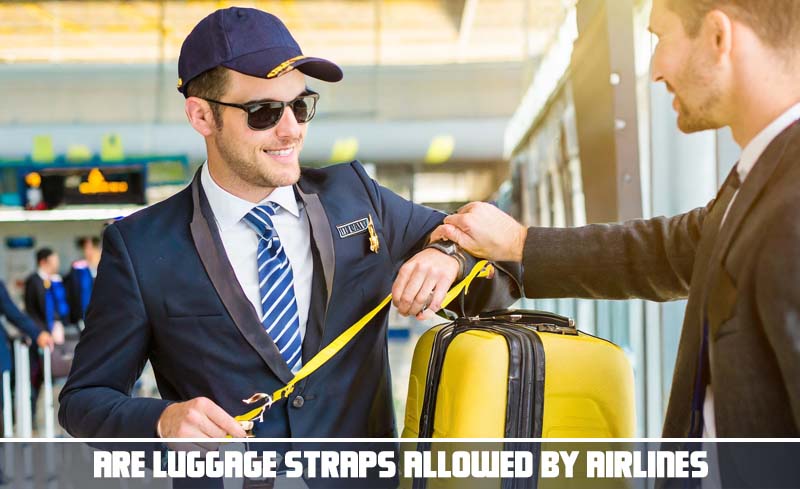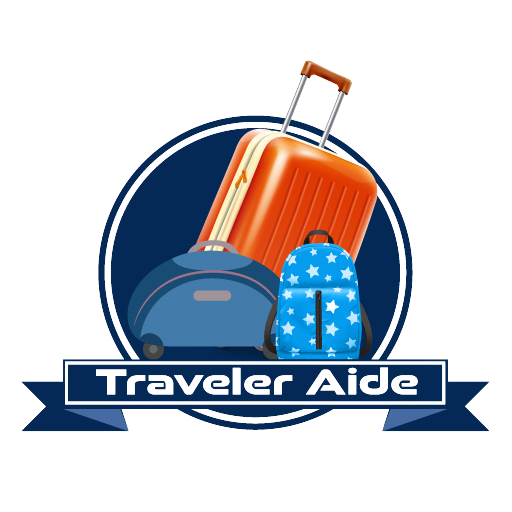As a seasoned traveler, I have a lot of knowledge about backpacks, travel, airport security, and hiking equipment. I traveled many times and faced more airport security systems. I have learned much about traveling through airports, airlines, and TSA.
One question I get asked often, especially from first-time fliers, is whether or not luggage straps are allowed.
The answer, in general, is yes, luggage straps are permitted by most airlines. But, there are some restrictions and guidelines to be aware of.
I have used straps on many trips and want to share my experience to clarify this topic. Let’s get started.
Understand Airline Luggage Restrictions
Over the years, I’ve learned a thing or two about navigating airport security and airline baggage policies. The rules for luggage straps are different for each airline. It depends on their specific restrictions. Some allow straps, while others prohibit them.
The general rule of thumb is that any strap used to secure your luggage should be removable and flexible. Weapons are not allowed, so no metal or hard plastic straps are permitted. You can usually use soft straps, belts, or netting if they can be easily removed for security checks.
When you go on your trip, you should check with your airline about their luggage strap policy. From my experience, I’ve learned that major airlines like Delta, American, and United allow removable or adjustable straps, belts, or netting for bags.
As long as they don’t cause any harm or problems during screening. Budget airlines can be more restrictive, so double-check.
If your luggage strap is not allowed, you must remove it to check your bag. I advise using straps that you can unbuckle or untie in a few seconds to avoid holding up the line or frustration for yourself or the gate agent. As a courtesy, try to remove any straps before checking in your bags to move the process along.
The most important thing is ensuring your luggage makes it to your destination in one piece. Do what you must to secure your bags, even leaving the straps behind correctly. Your vacation or trip is worth more than any strap! With some pre-planning, you can avoid issues with luggage straps and enjoy a smooth airport experience.
Do Major Airlines Allow Luggage Straps?
The good news is that most major airlines permit luggage straps. However, specific guidelines must be followed to ensure a smooth travel experience.
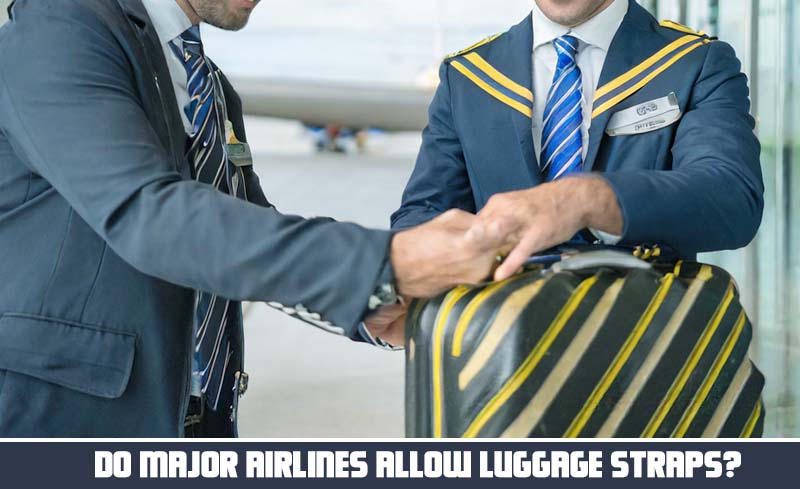
Straps Must Be Removable
Any straps you use must be easily removable if TSA Approved or airline staff need to open your bag for inspection. Zip ties, locks, and permanently attached straps are prohibited. I recommend adjustable straps with buckles that can be quickly undone if needed.
Don’t Overtighten the Straps
Make sure any straps you use still allow your luggage to open fully and the contents to be easily accessed. Tight straps can damage your bag or make it difficult for staff to open it. As someone who’s had to undo straps hurriedly at the check-in counter, I can tell you it’s not fun!
Declare Any Straps at Check-In
It’s best to declare any luggage straps you use to the check-in agent. While straps are typically allowed, some airlines may want to inspect them or have you remove them before your bag is accepted. It’s better to be safe than sorry, so I always declare any straps or locks when I check in.
Be Prepared to Remove Straps if Asked
Though rare, you may be asked by TSA or airline staff to remove any straps from your checked luggage before it’s accepted. As an experienced traveler, it’s best to remain polite and cooperative. Remove any straps as requested, then re-secure your luggage once cleared. It may be inconvenient, but following the rules will ensure a smooth trip!
So there you have it, the ins and outs of using luggage straps when flying significant airlines based on my years of experience. By following these tips, your luggage will arrive securely at your destination, and you’ll have a stress-free trip.
TSA Guidelines on Luggage Straps
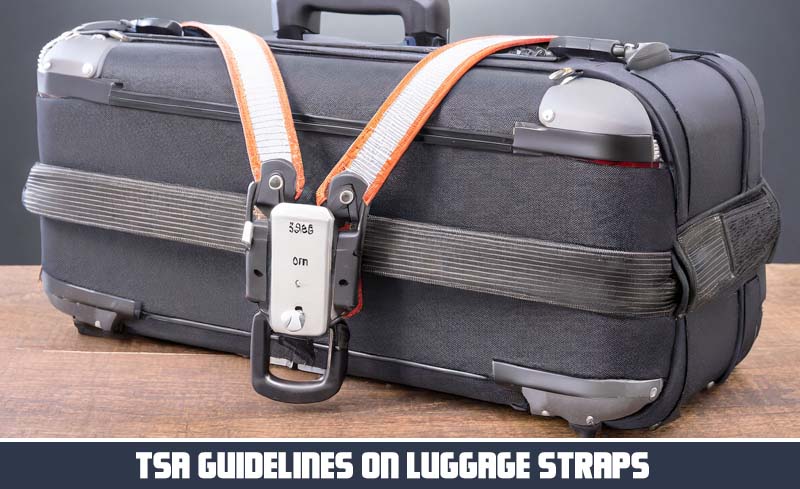
The Transportation Security Administration (TSA) allows the most common luggage straps, bungee cords, and zip ties in carry-on and checked baggage.
But avoid any straps with sharp or pointed edges that could be used as a weapon. It also prevents straps made from materials that could be an explosive risk, like detonation cords. If the straps are made for luggage and have nothing prohibited, they can go through the X-ray scanner.
Some airlines may have extra restrictions on the straps allowed in the cabin. So, I always check with my airline before heading to the airport. Some airlines don’t allow elastic cords, bungee straps, or zip ties in carry-on bags. The straps might move during the flight and block doors or compartments. If unsure, pack the belts in your checked baggage to avoid issues.
I am an expert in travel and spend a lot of time going through airport security. I advise using simple nylon or polypropylene luggage straps to close your bags.
When using straps, cords, or ties, make sure they don’t have any prohibited items. Follow TSA and airline guidelines for carry-on and checked baggage.
Airline-Specific Luggage Strap Policies
I’ve packed and unpacked so many bags over the years I can’t count them. I always use straps to keep everything secure. But not all airlines allow straps, so you must check with the airline you’re flying to before using them.
Personally, I always pack light and use straps to compress my belongings into a carry-on. It avoids the risk of straps not being allowed for checked baggage. Delta, United, American, and Alaska Airlines let you use flexible straps on bags. The straps can’t have hard or sharp parts. The straps should keep your bags closed and not harm them or be unsafe.
But budget airlines like Frontier, Spirit, or Sun Country might not allow straps. They worry that straps could cause problems with handling luggage or prevent bags from being checked. To keep your bags safe, these airlines suggest using zippers, buckles, or locks on your luggage.
I suggest taking off the straps before checking your bags. Only use them for carry-on luggage. Take this precaution to avoid the airline cutting you off or flagging your bags. Before you travel, make sure to check your airline’s current policy on luggage straps. Policies are subject to change, so what was allowed on your last trip may differ for your next one.
Tips for Using Luggage Straps Safely When Flying
Straps are handy for keeping everything in your checked bags, but you must follow the rules.
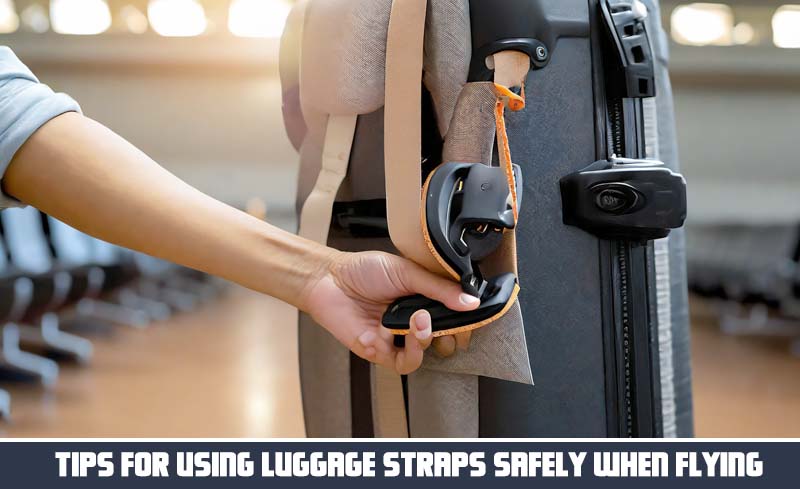
Check with Your Airline’s Policy
Different airlines have different policies on luggage straps. So check with them before you pack. Most airlines allow straps, but some only allow certain types, like elastic or nylon. Metal or stiff plastic straps are typically prohibited. International airlines tend to have stricter policies, so double-check if traveling overseas.
Don’t Over-Secure Your Bags
Use straps to secure your luggage, but ensure they can still be opened if necessary. TSA may need to inspect your bags, so belts that are too tight or need tools to undo could cause issues. As a rule, any straps you use should be undone by hand.
Consider Using TSA-Approved Locks
If security is a concern, TSA-approved locks are a good option. These special locks let baggage screeners unlock and re-lock your bags without breaking the lock. Following TSA’s guidelines, you can secure your luggage straps through the lock to prevent theft.
Place Straps Strategically
Run straps in an “X” shape over your luggage, with the ends fastened at opposite corners for the most secure closure. You can also place straps over your bag’s zipper track and main compartments. Ensure the straps are tight but loose enough for airport staff to open your bags.
You can use these tips to confidently secure your checked bags with luggage straps for air travel. Before you travel, make sure to contact the airline. Keep the belts tight, and use approved locks. Also, position the straps for better outcomes. With clever planning, straps, and air travel can go hand in hand.
Conclusion
Luggage straps play a crucial role in securing our belongings during travel. Most major airlines allow luggage straps and belts as long as they don’t damage the bags or make them difficult to handle.
If you avoid anything too complicated or potentially dangerous. Use straps to keep your bags secure. Also, you need to understand airline policies and TSA guidelines.
So, following these tips, you can travel smoothly and keep your luggage safe. These tips will help you have a smooth trip and avoid surprises. Let me know if you have any other questions!

Hey, I’m Dorothy E. Turner! I’ve spent years exploring the world and diving deep into the travel scene. Along the way, I’ve developed a real knack for understanding what makes a great travel backpack. I’m passionate about sharing my expertise to help fellow travelers find the perfect backpack for their adventures.

